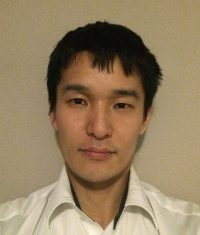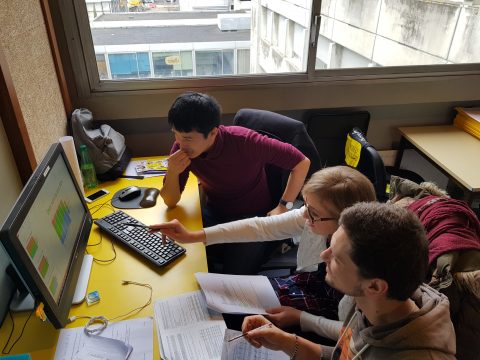Shimamoto Tomonari
Ph.D Student, School of Public Health, Graduate School of Medicine
|
 |
Motivation for Research in Bordeaux
For the purpose of maintaining and improving health, our research laboratory implements projects focusing on monitoring lifestyles and diseases of university students from their first medical examinations throughout their whole life. The Research Center “Bordeaux Population Health”, which is the destination for my exchange, also conducts long-term medical examinations of students. Since the Kyoto-Bordeaux Symposium in 2015, there is also an active exchange between research groups from both universities. Wishing for developing my doctorate research, I decided to apply for a research stay in Bordeaux by Erasmus+ program.
Internal preparations by the university before and after the application
Seven to eight month prior to the exchange, I went forward compiling research plans through video conferences with professors and staff members from Bordeaux. Preparations like finding accommodation and Visa procedures followed in the months after the call-out and the end of the selection process. As for academic measures, it was necessary to conclude a “Learning agreement”. This includes arrangements concerning course programs and credit transfer and observation of the rules concerning the usage of research facilities and research publication. The agreement was exchanged between the institution, where the student was registered, and the designated institution. Even though some preparation was necessary, thanks to the support of various staffs at Kyoto University and my destination, everything went very smoothly.
Differences of working culture between Japan and France
Communication is highly valued here. The desks are not separated from each other and except for the professor’s office and the doors are usually left open. It is an environment where researchers and students can freely ask questions and discuss their research with each other. I think that great importance is attached to interdisciplinary exchange, even though working groups are separated based on the field of study. I myself had various discussions with specialists in statistics and epidemiology. This way, I was able to deepen my knowledge in the interpretation of data and learned new analyzing methods.
Living in Bordeaux
It is quite nice to live in Bordeaux. Although it is slightly north of Sapporo in latitude, the climate is warm and even in winter the temperatures rarely drop below zero. At a welcome reception for foreign researchers in October, I met many other Japanese researchers. I was also invited to many parties and various events organized by fellow researchers and members of the university. This helped me to get in touch with French culture on many occasions. The city itself is registered as World Heritage and there are a lot of churches and historical sites to explore. It is also a good place if you want to visit other parts of Europe. It only takes 2 hours to Paris. The same applies to Spain and the Atlantic Ocean.
Is French language proficiency necessary?
At the laboratories and offices, communication is mainly done in English. So, it is possible to conduct your research without speaking any French. However, once you leave the university there is hardly any information in English. It is common that even shop staffs can’t speak English.
Besides, I think your stay will be more fun and your daily life less stressful if you know French.
What do you take from your research abroad?
Before I went abroad I was a bit worried, but I was blessed to meet many friendly people and I’m now thankful that I could do research while having fun. Until then, I had rarely the chance to directly meet researchers from abroad, except at conferences. Studying abroad was a great improvement for my international communication abilities. I believe that by working together while I was staying in Bordeaux and communicating daily face-to-face with my colleagues, I could build a relationship of trust, which surely contributed to strong networks that will lead to intensified collaboration in the future.
I also learned the importance of an open mind: In France there is the culture of strictly separating work from private life. You are busy researching in the first half of the day. In the evening, you would refresh your mind by drinking a good glass of wine and rest well while being on vacation. By directly getting in touch with this culture, I made a very important experience.




